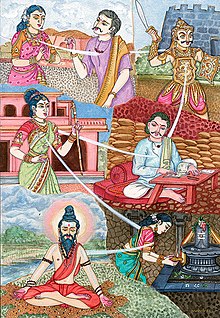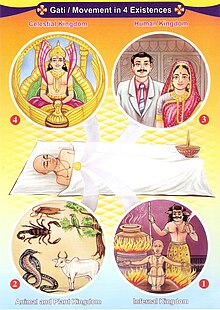

Reincarnation, also known as rebirth or transmigration, is the philosophical or religious concept that the non-physical essence of a living being begins a new life in a different physical form or body after biological death.[1][2] In most beliefs involving reincarnation, the soul of a human being is immortal and does not disperse after the physical body has perished. Upon death, the soul merely becomes transmigrated into a newborn baby or an animal to continue its immortality. The term transmigration means the passing of a soul from one body to another after death.
Reincarnation (punarjanman) is a central tenet of the Indian religions such as Hinduism, Buddhism, Jainism, and Sikhism.[3][4][5][6] In various forms, it occurs as an esoteric belief in many streams of Judaism, certain pagan religions including Wicca, and some beliefs of the Indigenous peoples of the Americas[7] and Aboriginal Australians (though most believe in an afterlife or spirit world).[8] A belief in the soul's rebirth or migration (metempsychosis) was expressed by certain ancient Greek historical figures, such as Pythagoras, Socrates, and Plato.[9]
Although the majority of denominations within Abrahamic religions do not believe that individuals reincarnate, particular groups within these religions do refer to reincarnation; these groups include the mainstream historical and contemporary followers of Cathars, Alawites, Hassidics, the Druze,[10] Kabbalistics, Rastafarians,[11] and the Rosicrucians.[12] Recent scholarly research has explored the historical relations between different sects and their beliefs about reincarnation. This includes the views of Neoplatonism, Orphism, Hermeticism, Manichaenism, and Gnosticism of the Roman era, as well as those in Indian religions.[13] In recent decades, many Europeans and North Americans have developed an interest in reincarnation,[14] and many contemporary works mention it.
- ^ McClelland, Norman C. (2010). Encyclopedia of Reincarnation and Karma. McFarland. pp. 24–29, 171. ISBN 978-0-7864-5675-8. Archived from the original on 26 November 2016. Retrieved 25 September 2016.
- ^ Juergensmeyer, Mark; Roof, Wade Clark (2011). Encyclopedia of Global Religion. SAGE Publications. pp. 271–272. ISBN 978-1-4522-6656-5. Archived from the original on 31 March 2019. Retrieved 25 September 2016.
- ^ Juergensmeyer & Roof 2011, pp. 271–272.
- ^ Laumakis, Stephen J. (2008). An Introduction to Buddhist Philosophy. Cambridge University Press. pp. 90–99. ISBN 978-1-139-46966-1. Archived from the original on 21 January 2017. Retrieved 25 September 2016.
- ^ Rita M. Gross (1993). Buddhism After Patriarchy: A Feminist History, Analysis, and Reconstruction of Buddhism. State University of New York Press. p. 148. ISBN 978-1-4384-0513-1.
- ^ Flood, Gavin D. (1996), An Introduction to Hinduism, Cambridge University Press
- ^ Gananath Obeyesekere, Imagining Karma: Ethical Transformation in Amerindian, Buddhist, and Greek Rebirth. University of California Press, 2002, p. 15.
- ^ Crawley[full citation needed]
- ^ see Charles Taliaferro, Paul Draper, Philip L. Quinn, A Companion to Philosophy of Religion. John Wiley and Sons, 2010, p. 640, Google Books Archived 2022-12-12 at the Wayback Machine
- ^ Hitti, Philip K (2007) [1924]. Origins of the Druze People and Religion, with Extracts from their Sacred Writings (New Edition). Columbia University Oriental Studies. 28. London: Saqi. pp. 13–14. ISBN 0-86356-690-1
- ^ Fernández Olmos, Margarite; Paravisini-Gebert, Lizabeth (2011). Creole religions of the Caribbean: an introduction from Vodou and Santería to Obeah and Espiritismo. Religion, race, and ethnicity (2nd ed.). New York: New York University Press. p. 186. ISBN 978-0-8147-6227-1. OCLC 702357503.
- ^ Heindel, Max (1985) [1939, 1908] The Rosicrucian Christianity Lectures (Collected Works): The Riddle of Life and Death Archived 2010-06-29 at the Wayback Machine. Oceanside, California. 4th edition. ISBN 0-911274-84-7
- ^ An important recent work discussing the mutual influence of ancient Greek and Indian philosophy regarding these matters is The Shape of Ancient Thought by Thomas McEvilley
- ^ Haraldsson, Erlendur (January 2006). "Popular psychology, belief in life after death and reincarnation in the Nordic countries, Western and Eastern Europe". Nordic Psychology. 58 (2): 171–180. doi:10.1027/1901-2276.58.2.171. S2CID 143453837.